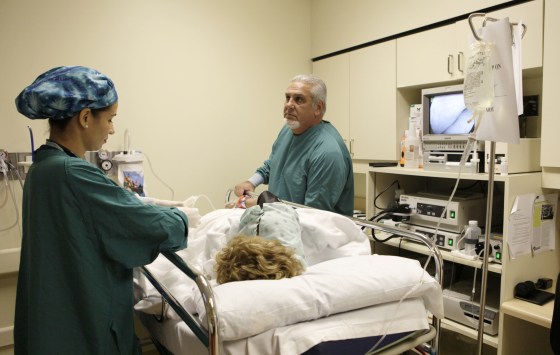
A federal judge struck down a provision in the Affordable Care Act that requires insurers to cover preventive health services, which includes a number of cancer screenings.

People younger than 50 could no longer be eligible for free colon cancer screenings, if a federal judge's ruling stands. Lynne Sladky / AP file
March 31, 2023, 7:14 PM UTCA federal judge’s ruling on the Affordable Care Act this week means that patients would have to pay for some cancer screenings that are currently free — a ruling that, if it holds, could make the potentially life-saving tests unaffordable for many, experts say.
On Thursday, U.S. District Court Judge Reed O’Connor struck down provisions of the ACA that requires insurers to provide certain preventive health care services free of charge.
The move could “ultimately result in more individuals being diagnosed with their cancer at later stages, where our treatments are more toxic, less effective and far, far more expensive,” said Dr. Craig Bunnell, chief medical officer of the Dana-Farber Cancer Institute in Boston.
“The ruling essentially disregards preventive measures that have been shown to be effective at preventing disease and saving lives over the last 13 years,” Bunnell said.
A report from KFF, formerly known as the Kaiser Family Foundation, released earlier this month found that, in 2018, about 60% of the 173 million people with private health insurance used at least one of the free preventive services mandated by the ACA.
Among those services is colorectal cancer screenings for people in their late 40s — a group that has seen a jump in colon cancer rates over the past three decades.
Before 2010, colonoscopies were covered for people ages 50 and above. The ACA lowered that age to 45. The new ruling suggests that insurance companies could go back to charging men and women under age 50 anywhere from a small co-pay to a large deductible for colon cancer screening.
“One thing about colonoscopy is that it is literally curative,” said Lisa Lacasse, president of the American Cancer Society Cancer Action Network, a nonprofit, nonpartisan advocacy group of the American Cancer Society. “You go in and have a colonoscopy and they are able to find and remove a polyp.”
Without that screening, Bunnell said, those polyps can become cancerous and become invasive. Now you’ve got somebody who is going to require more extensive surgery, may require chemotherapy or may die from their disease that was totally preventable.”
Mammograms to detect breast cancer would unlikely be impacted by the judge’s ruling, but screening for lung and skin cancer could.
Experts maintain that all evidence-based cancer screening should be covered completely by insurance.
“Early cancer screening — whether it’s mammography, whether it’s cervical cancer, prostate cancer, colorectal cancer — being able to screen and have early detection is critical,” said Donna Grande, CEO of the American College of Preventive Medicine.
Grande said that even co-pays present a barrier to getting early care.
“There’s going to be people having to make judgment calls,” she said. “People are looking at where they are going to put their limited dollars.”
Preventive care does not always make the list of priorities.
“Anytime we create any version of a barrier, or we don’t eliminate a barrier, we worry about screening rates going down,” Lacasse said.
The Biden administration is likely to appeal the decision.
“Patients should absolutely not cancel a scheduled screening,” Lacasse said, “because this will not go into effect until it’s worked its way through the courts.”
But if the ruling holds, people shouldn’t expect any immediate changes to their health care coverage, according to Larry Levitt, the executive vice president for health policy at KFF.
“In many cases, insurance contracts are in place for the calendar year,” Levitt said. “So while the ruling takes effect immediately, nationwide coverage will not necessarily change immediately.”
Insurers are also required to give advance notice — usually 60 days — about changes in benefits, he said. And even if insurers do make changes, they’re unlikely to drop preventive services altogether.
“But insurers may very well charge patient cost-sharing for these services,” he added.
Matt Eyles, president and CEO of AHIP, a group that represents the insurance industry, said in a statement that there would be no imminent changes. “Americans should have peace of mind there will be no immediate disruption in care or coverage,” he said.
Some major insurance companies have already pledged to continue to provide coverage for preventive health services no matter the outcome of the ruling.
Justine Sessions, a spokesperson for Cigna, told NBC News that the insurer intends to provide preventive screening coverage with no cost-sharing “regardless of the final outcome of this court case.”
Anthem said in a statement that it plans to continue to cover preventive screenings despite the ruling. UnitedHealth Group, the largest insurer in the U.S., did not immediately reply to a request for comment.
Erika Edwards is a health and medical news writer and reporter for NBC News and "TODAY."
Berkeley Lovelace Jr. is a health and medical reporter for NBC News. He covers the Food and Drug Administration, with a special focus on Covid vaccines, prescription drug pricing and health care. He previously covered the biotech and pharmaceutical industry with CNBC.